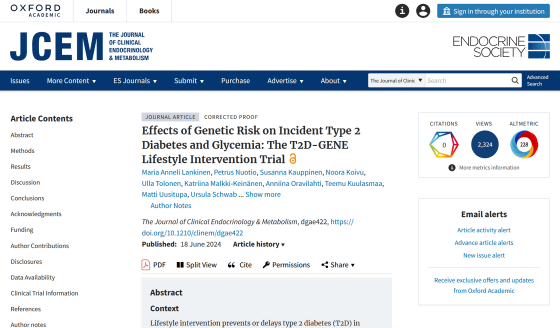Experiments confirm that even people with a high genetic risk of type 2 diabetes can reduce their risk by improving their diet and exercise

Effects of Genetic Risk on Incident Type 2 Diabetes and Glycemia: The T2D-GENE Lifestyle Intervention Trial | The Journal of Clinical Endocrinology & Metabolism | Oxford Academic
https://academic.oup.com/jcem/advance-article/doi/10.1210/clinem/dgae422/7695531

Type 2 diabetes can be prevented by diet and exercise even in individuals with a high genetic risk | University of Eastern Finland
https://www.uef.fi/en/article/type-2-diabetes-can-be-prevented-by-diet-and-exercise-even-in-individuals-with-a-high-genetic-risk
Diet And Exercise Could Outsmart Your Genes in Risk For Type 2 Diabetes : ScienceAlert
https://www.sciencealert.com/diet-and-exercise-could-outsmart-your-genes-in-risk-for-type-2-diabetes
According to the International Diabetes Federation , one in 11 adults worldwide has diabetes, and more than 90% of these have type 2 diabetes. To date, researchers have identified more than 500 genetic variants that increase the risk of type 2 diabetes, and not only these genetic factors but also lifestyle factors are associated with the risk of developing type 2 diabetes.
Lifestyle-related risk factors for type 2 diabetes include being overweight, having low dietary fiber intake, having a high intake of saturated fatty acids, and lack of exercise. It is known that improving these lifestyle habits can effectively prevent type 2 diabetes, but it was unclear whether this would also be effective in people with genetic factors for type 2 diabetes.
To investigate whether lifestyle changes can be beneficial in people with genetic predisposition to type 2 diabetes, a research team from the University of Eastern Finland and other institutions conducted an experiment on 973 men aged 50 to 75 years living in eastern Finland. All subjects in the experiment were prediabetic, with high fasting blood glucose levels, and some had a high genetic risk of type 2 diabetes, while others had a low genetic risk.

The research team divided the subjects into an 'experimental group that received lifestyle intervention' and a 'control group that did not receive lifestyle intervention,' and the experimental group received group sessions on the importance of healthy eating and physical activity, individual nutritional feedback from a clinical dietitian, and a diet and exercise guide for the next three years. After the first group session, support was provided through a web portal designed for the study.
In the experimental group, 313 participants had a high genetic risk of type 2 diabetes and 315 participants had a low genetic risk, while in the control group, 149 participants had a high genetic risk and 196 participants had a low genetic risk.
The results showed that subjects in the experimental group who were at high genetic risk had a 6% lower risk of developing type 2 diabetes compared with subjects in the control group who were at high genetic risk. And although weight loss was not the goal of the study, subjects in the experimental group reported benefits such as weight loss and improved metabolism, regardless of their genetic risk.
In subjects with low genetic risk, the difference in risk of developing diabetes between the experimental and control groups was not significant, but there were effects such as weight loss and improved blood sugar levels, suggesting that even people with low genetic risk can benefit from lifestyle modifications.

'These findings encourage everyone to make lifestyle changes that promote health,' said Maria Lankinen , lead author of the study and lecturer in nutrition at the University of Eastern Finland. 'Furthermore, they demonstrate the effectiveness of group and internet-based lifestyle advice, which can also save healthcare resources.'
Related Posts:
in Free Member, Science, Posted by log1h_ik







